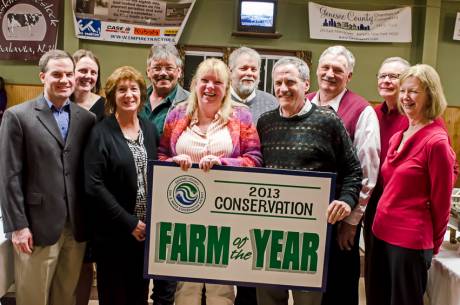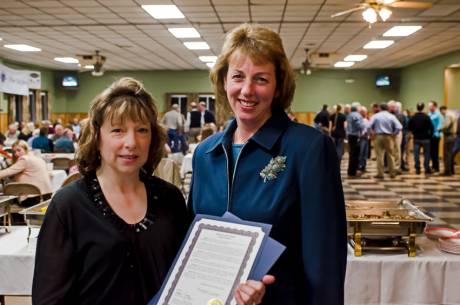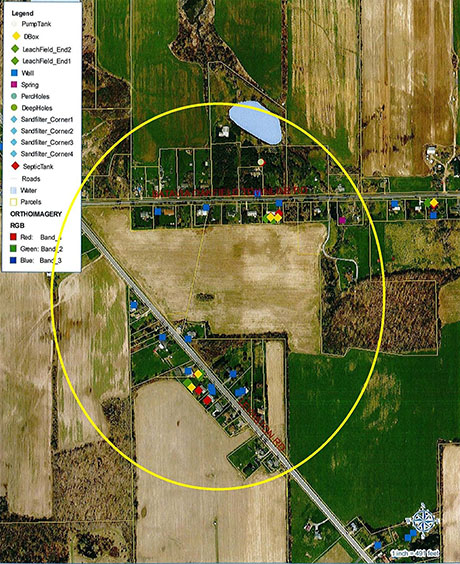This is the sixth in our series on Genesee County's farms and farmers. For previous stories, click here. (Obviously, I started this story in late fall and am only now publishing it.)
Onions. It seems simple, right? Plant a seed and a few months later pull up a bulb and soak in the pungent aroma of one America's most essential foods.
Try making a stew or a salad without an onion. Edible? Maybe. Good? Hardly.
But which onion?
The cook considers white, red, yellow or perhaps green.
The farmer considers Bradley, Walla Walla, Candy, Sterling, Yankee, Sedona, Redwing and Crocket, among hundreds of other varieties.
A rose by any other name may smell just as sweet, but for the onion farmer, the name on the seed bag he plants in the spring has a lot to do with yield he can expect in the fall.
The seed, the weather, the soil depth, the week of planting, the plot location, length of storage and what's going on in onion markets all over the world are the layers an onion farmer peels away each season hoping to rediscover that savory recipe called profits.
"There are dozens and dozens of varieties," said Matt Mortellaro, co-owner with his brother Paul, of G. Mortellaro & Sons, and Elba-based onion farm. "It's hard to know each year which varieties are working well. Every piece of ground is a little different and every season is a little different. You can have varieties growing hundreds of yards apart and get different results. The rain falls more in one location. It floods a little more. There's the wind and the soil. You can have so many different conditions, which is why we grow so many different varieties."
Paul and Matt were born into this, growing onions on the muck.
Paul helped out on the family farm from a young age. Matt being younger was spared by more modern farm equipment the hours of grueling seed and sprout planting and weed pulling under the blistering sun on the black muck.
"Mainly, I remember riding around in the truck with my dad," Matt said.
Matt studied natural resources, conservation and biology at Cornell before deciding to concentrate on ag production and plant biology.
Paul set out as a young man to be an engineer, earning a degree with the University at Buffalo and he worked in that field for a few years before feeling the tug of the family farm.
"It was strange," Paul said. "The engineering wasn't bad, but it really wasn't the lifestyle I was used to. You go to work and you're done at the end of the day. I feel like I'm a farmer twenty-four-seven."
As a farm owner, you get up early to check the weather. You take calls from customers needing to pick up a load of onions at 11 p.m. You make repairs, check crop reports and answer e-mails long after the guy with an office job has hopped in his car, made the long drive home and is tuning into Sports Center.
"That's typical for employees and I can't say I blame them," Paul said. "Without the ownership interest, they just disappear and there is no way to retrieve them. I guess I don't need that. I don't need to feel like my responsibilities end at five o'clock."
Paul and Matt's grandfather started the family in the onion farming business in 1935 with eight acres of muckland.
Gerlando Mortellaro didn't speak English and worked other jobs to make ends meet. By the time he handed the farm off to his two sons -- Paul and Matt's father and uncle -- the family owned 110 acres of muckland.
The farm is 260 acres today, and while other family farms in the area have diversified and added crops on the uplands, the Mortellaros stick with with what they know -- onions grown in the dark, decaying organic matter that made Elba famous.
"I think I would like growing anything, but onions is what I know," Paul said. "I've been exposed to onions for 41 years. It's kind of in my blood now. I don't know what else to do."
Paul said he kind of imagines if he was plunked down in a strange country, it wouldn't be long before he started growing onions again. When he meets strangers, he said, it's hard not to assume they're onion farmers, too.
"I have actually said it a couple of times, kind of as a joke, 'tell me about your onion operations,' " Paul said.
Matt is just as focused on growing onions on the muck.
"I don't have experience commercially growing other things on mineral soil, so it's hard to compare," Matt said. "I know the frustrations of growing on the muck, but I don't know if that's different from growing different things on other soil types."
Both Paul and Matt have been able to find enough time away from onion farming to get married and raise families.
Paul is married to Tricia and they have two daughters -- Rosalie, 19, an engineering student at Rensselaer Polytechnic Institute, and Grace, 17, a student at Notre Dame High School.
Matt is married to Stephanie and they have two boys, Mateo, 13, and Tiago, 10.
With the variety of onions the Mortellaros might choose to grow in any one season, there is one trait they all share -- they're what's known as long-day onions.
There are short-day onions and long-day onions. The two types use different triggers for when to form a bulb. For the short-day onion, it's just a matter of time, how many days since the seed was planted. Long-day onions know when the longest day of the summer has arrived and that's its signal to form a bulb.
Long-day onions not only grow better in our region, they make for better storage onions.
The Mortellaros sell onions all year long, even when temperatures outside dip into the teens and no plow can possibly till any soil.
In a good growing season, those 260 acres of muckland have filled the Mortellaros 50,000-square-foot storage facility on Transit Road with enough pungency to last into spring.
When customers need onions, or the price is right, Paul and Matt -- under the brand name Crybaby Onions -- almost always have onions to sell.
"With storage onions, we don't have to discount it to get rid of it," Paul said. "Out West, they sell onions for three weeks and then they're onto melons or something else. Here, you can just wait. If you don't like the price, you can wait. When you get a price you like, you go. That is a much better way to maintain steady customers. That's the beauty of storage, whether it's onions, potatoes or cabbage. You can sell it all in one week, but that's usually a disadvantage."
Storage adds to the pungency of an onion and Paul likes a pungent onion -- hence the Crybaby brand, but Paul warned the home cook not to think that storing a store-bought onion will improve its quality.
By the time an onion reaches the produce section of a supermarket, it's been through cold storage and a warming period, which is the onion's signal to sprout (an onion in its first year produces a bulb; in it's second year, it goes to seed).
"The onion only knows it's ready to go," Paul said. "There's no turning back. It's really hard to buy an onion that hasn't been through the cold and warm cycle, so my advice is to eat an onion fast. Sprouted onions are actually very good, but you can always buy more."
With onions such a staple of America's diet, Paul and Matt always want to grow the best quality onion possible at the highest profit margin possible, even if Mother Nature doesn't always cooperate.
"Growing onions is somewhat of an art and somewhat of a science," Matt said. "Certain onions are ready for harvest in 95 days, others in 120. Depending on where you're planting, some need more time. Certain varities do better in different ground and some are marginal. Certain varieties produce more tonnage, but the bulb is not that great, and others don't have as high a yield, but have big, beautiful bulbs. So there's a lot of thought that goes into deciding what to plant in a particular piece of ground."
Onion farming, like the onion itself, may look simple from the outside, but then, just start peeling away the layers. The Mortellaros do it, day in and day out, 365 days a year.






















